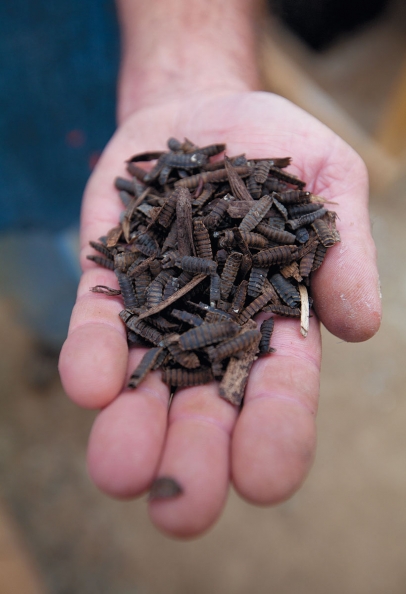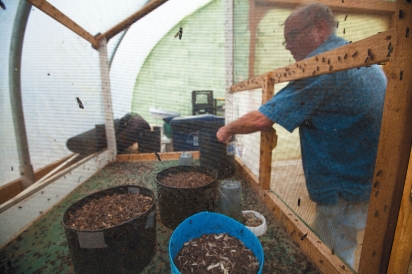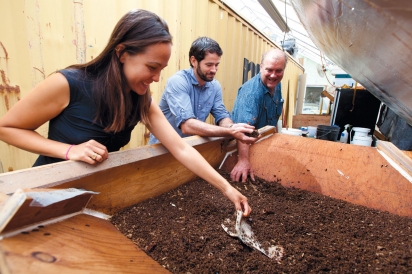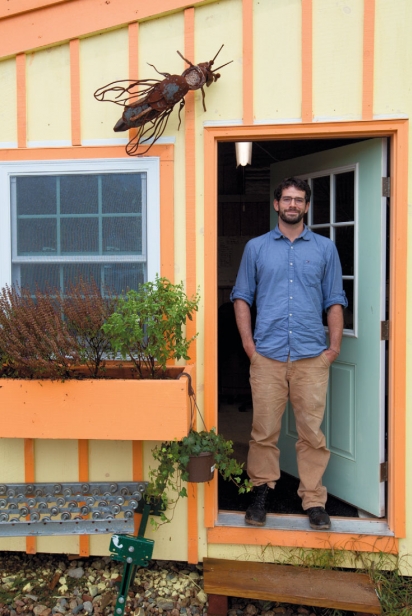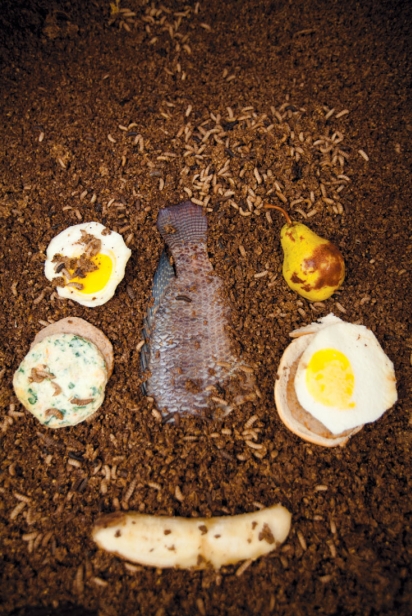Black Soldier Flies to the rescue
Li Ling Hamady is elbow-deep in maggots. Writhing with blind purpose, six inches deep in a tub of spent beer grains, they appear to be a single creature, rather than thousands of individual future black soldier flies.
“That’s a T-bone steak right there,” says Bill Mebane, Hamady’s boss, sifting through the squirmy mass.
Before you throw down this magazine in disgust, consider these facts:
1) Black soldier fly larvae consume three to four times their body weight in organic waste per day.
2) Dried fly larvae are 40-60% protein.
3) Chickens and fish love to eat fly larvae. Chicken eggs are 19% protein; fish are 15-25%.
4) Globally, fish provide 4.3 billion people with 15% of their protein needs. As wild fish populations decrease, aquaculture is expected to fill the demand.
From their rented greenhouse at Miskovsky Landscaping in East Falmouth, the inventive minds behind Equatorial Feeds are concocting the perfect recipe for converting organic waste into palatable protein. Spent grains from local breweries, kitchen scraps from area hotels, and the employees’ own compost bins all go into a complex ratio of waste in, protein out.
In an increasingly food-insecure world, insects have been hailed as a nutrient-dense and cheap solution to malnutrition. Black soldier flies will munch on almost any organic waste—including human and animal waste—and turn it into nutty-tasting protein and rich compost. And goodness knows, we throw away plenty of organic material. But eating maggots? That’s hard to stomach.
Luckily, other animals that humans like to eat—fish and chicken in particular—love eating maggots, more palatably known as grubs or fly larvae. Ground into meal, combined with other feedstocks, and pressed into meal or oil, black soldier flies present a new horizon for animal feed that doesn’t require fishing the last herring or converting the last acre of rainforest into soybean.
“The biggest problem with raising fish—or anything else—is feed. Protein is the real stumbling block. We’re on an eternal quest for protein,” says Equatorial Feeds founder Bill Mebane. Formerly the head of aquaculture engineering at the Marine Biological Laboratory in Woods Hole, Mebane has devoted his career to solving the intertwined issues of marine pollution, overfishing, and hunger. This path led him to set up the Sustainable Aquaculture Initiative in Haiti and initially start up Equatorial Feeds, LLC in Uganda.
There’s one important element at the heart of most food security issues: nitrogen. The air we breathe, the protein we eat, and the waste we excrete is filled with it. But creating fertilizer from the air to grow food (which is, essentially, nitrogen) is incredibly energy-intensive. Once that fertilizer is created or the food it helps grow is consumed, it takes even more energy to remove the excess nitrogen from water— where it can become a pollutant.
“One of the biggest challenges in the world is nitrogen. It’s expensive to produce, then it’s hard to get rid of,” Mebane says, in a nod to Cape Cod’s own nitrogen-loaded wastewater crisis.
And that’s what turned Mebane on to black soldier flies. A native of North America, they’re known around the world as a source of sustainable protein for aquaculture or animal feed (and even human food). As they eat our agricultural detritus, the fly larvae castings create a rich soil amendment. In optimal conditions, the only byproduct they create is carbon dioxide.
In a large screened-in cage inside the greenhouse, dozens of flies zoom around in lazy circles, landing on a pile of damp wood chips on the cage to drink, groom, mate or—as Hamady and Mebane hope— lay their eggs. Once that happens, the flies will die and their eggs will be transferred to climate-controlled containers filled with a paste made from chicken feed. According to Mebane, ⅛th gram of eggs will grow into two pounds of larvae. When dried and ground into meal, that’s nearly a pound of pure protein.
Within a few days, the larvae are big enough to be transferred to an open grow-out container. They’re photophobic, preferring dark, moist and warm environments like the one Hamady has created in a large tub of spent beer grains, the odd fish carcass or breakfast remnant poking out of the brown crumbly mixture.
After about nine days, the larvae darken in color and become attracted to light. In this pre-pupal phase, they “self-harvest”, crawling out of the tub and into a pool of water where they can easily be scooped out and put into burrowing material for their next phase as pupae. Before this stage they also self-sanitize, excreting any remnants of food and bacteria and potential human pathogens. That makes it safe to turn them into meal—or let them hatch into adult flies to propagate the next generation. (Adult black solider flies do not eat, and die after about a week.)
This seemingly simple process is fraught with variables. Flies prefer temperatures in the 80s. They need specific amounts of light and humidity at different stages in their short lives. Certain food sources can create unpleasant smells or even kill the whole crop—though under ideal conditions, the smell takes on the odor of the food source, like pears or bacon. Hamady, who got her PhD in shark biology from MIT, has faced a steep learning curve and a lack of published research on domesticating insects. But she’s enjoying the challenge of applied research.
“It takes a lot of experimentation to figure out the ideal conditions. Think of how long it took to figure out how to domesticate cows, for instance. It’s still going on,” Hamady says.
Considering the problems of malnutrition, food waste and overfishing that black solider flies may help solve, she has no regrets about abandoning charismatic megafauna research for life as a “maggot rancher.”
“I always wanted my work to change the world somehow. Big picture-wise it’s exciting to think about the opportunities for positive change and to get my hands dirty,” she says.
With less than a year of experimentation under its belt, Equatorial Feeds aims to produce 10 kg (22 pounds) of larvae per day by its first anniversary, and five times that by the spring. Aided by business manager Rhys Probyn, the company is working on figuring out the best sources of organic waste, as well as potential markets.
There are myriad products to be made from black solider flies: live larvae for fishing bait and exotic pets, oil or biodiesel from dried and ground larvae meal, soil amendment from their castings or a pharmaceutical ingredient called chitin from their exoskeletons. For now, Probyn says the company’s goal is to supply larvae meal to other companies that produce compound feed pellets. Due to regulations on producing chicken feed from other “animals”, the most likely domestic market for the pellets will be fish farms, says Probyn.
Typical fish farms feed their stocks with wild-caught fish meal at unsustainable ratios. The practice not only depletes wild fish stocks (causing wild fish to go hungry), it creates a nitrogen-heavy waste stream from the fish farms, leading to algae blooms and poor water quality.
“We import huge amounts of fish from other countries. Most of that winds up as fish food or dog food,” says Mebane. “If we can provide an alternative feed, more of that fish will end up on our plates or stay in the ocean.”
Probyn and Mebane first met in 2006 while working for the Sustainable Aquaculture Initiative at Marine Biological Laboratory, where Probyn later got a job as an aquaculture technician. After earning master’s degrees in environmental engineering technology and business, Probyn joined Mebane in Uganda to help with the nascent start-up.
Compared to the company’s experience in Uganda, finding organic waste is a snap on Cape Cod, says Probyn. In much of the developing world, waste streams are considered resources. In Massachusetts, waste is viewed as a liability—especially with the Commercial Food Waste Ban. This law, which came into effect in October 2014, requires any organization producing more than a ton of organic waste a week to compost it or send it to an anaerobic digester to be converted to energy.
“Right now, there’s a lot of waste streams but they’re going off-Cape. Until there’s an economic incentive, no one will look to alternative means of disposal on a large scale,” Probyn says. “We’re providing a potential solution to the problem.”
Cape Cod’s annual garbage load is composed of about 20% food and yard waste, according to Dave Quinn, the municipal assistance coordinator for Barnstable County and the Massachusetts Department of Environmental Protection. Groups like Equatorial Feeds, as well as municipalities, farms, and small businesses, are filling the gap for diverting organic material into more useful purposes, says Quinn.
“The cost of hauling and disposing of food waste is huge, compared to how easily and cheaply it can be composted,” Quinn adds. “It can be turned into a valuable resource rather than burning or landfilling it. From traditional composting, worm composting, black soldier flies, or anaerobic digestion, I don’t think there’s just one solution that will work. We need all of the above.”


